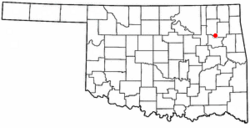Inola, Oklahoma facts for kids
Quick facts for kids
Inola, Oklahoma
|
|
|---|---|
| Nickname(s):
Hay Capital of the World
|
|

Location of Inola, Oklahoma
|
|
| Country | United States |
| State | Oklahoma |
| County | Rogers |
| Area | |
| • Total | 6.75 sq mi (17.47 km2) |
| • Land | 6.68 sq mi (17.30 km2) |
| • Water | 0.07 sq mi (0.18 km2) |
| Elevation | 574 ft (175 m) |
| Population
(2020)
|
|
| • Total | 1,890 |
| • Density | 283.02/sq mi (109.27/km2) |
| Time zone | UTC-6 (Central (CST)) |
| • Summer (DST) | UTC-5 (CDT) |
| ZIP code |
74036
|
| Area code(s) | 539/918 |
| FIPS code | 40-37100 |
| GNIS feature ID | 2412794 |
| Website | http://www.inolaok.com |
Inola is a small town located in Rogers County, Oklahoma, in the United States. It is part of the larger Tulsa Metropolitan Statistical Area. In 2020, about 1,890 people lived there.
The name Inola comes from the Cherokee word for "Black Fox." The town is also known as "The Hay Capital of the World" because of its strong connection to farming and hay production.
Contents
History of Inola
Inola's story began in 1889. A railway line, built by the Kansas and Arkansas Valley Railway, passed through this area. At that time, it was part of the Creek Nation in Indian Territory.
A post office opened in March 1890, first called Foyil. It closed briefly but reopened in April 1891. By 1901, about 100 people lived in the area. The town was officially planned out in 1902.
Coal Mining and Growth
Before Oklahoma became a state in 1907, coal mining started nearby. This led to a small population boom. Inola's population grew to 405 people by 1920.
However, as the coal industry slowed down, so did the town's growth. By 1950, only 294 people lived in Inola.
Modern Growth and Commuting
Things started to change in the 1950s. More people began to live in Inola and travel to Tulsa for work. Tulsa is about 28 miles away. This made Inola a "bedroom community," meaning people sleep there but work elsewhere.
Because of this, Inola's population grew again. It reached 584 in 1960 and 984 in 1970. By 2010, the population was 1,788.
Inola's Geography
Inola covers a total area of about 6.6 square miles (17 km2). Most of this area, about 6.5 square miles (17 km2), is land. A small part, about 0.1 square miles (0.26 km2), is water.
Population Changes Over Time
The number of people living in Inola has changed a lot over the years. Here's how the population has grown and shrunk:
| Historical population | |||
|---|---|---|---|
| Census | Pop. | %± | |
| 1910 | 405 | — | |
| 1920 | 498 | 23.0% | |
| 1930 | 398 | −20.1% | |
| 1940 | 395 | −0.8% | |
| 1950 | 294 | −25.6% | |
| 1960 | 584 | 98.6% | |
| 1970 | 948 | 62.3% | |
| 1980 | 1,550 | 63.5% | |
| 1990 | 1,444 | −6.8% | |
| 2000 | 1,589 | 10.0% | |
| 2010 | 1,788 | 12.5% | |
| 2020 | 1,890 | 5.7% | |
| U.S. Decennial Census | |||
Economy and Jobs
As mentioned, Inola is a bedroom community for Tulsa. This means many residents work in Tulsa.
In recent years, Inola has also seen new businesses open. In October 2020, a large factory opened in Inola. It belongs to Sofidel, a company that makes tissue paper.
Sofidel Factory
The Sofidel factory cost $360 million to build. It is very large, covering 1.8 million square feet. This factory has two main parts:
- A mill that turns wood pulp into paper.
- A facility that turns the paper into finished products like toilet paper and paper towels.
The factory created over 300 jobs. The company expects to double this number in the future.
Black Fox Power Plant Project
In the 1970s, there was a plan to build a nuclear power plant near Inola. It was called the Black Fox Nuclear Power Plant. The Public Service Company of Oklahoma (PSO) proposed it in 1973.
The plant was planned to be about 3 miles (4.8 km) outside of Inola. It would have used two large nuclear reactors. PSO believed the plant would bring many jobs and improve schools in the town.
However, many people, both from Inola and other places, worried about the safety of a nuclear plant so close to their homes. After nine years of arguments in court and some small earthquakes in the area, the plan was stopped in 1982. The power plant was never built.
See also
 In Spanish: Inola (Oklahoma) para niños
In Spanish: Inola (Oklahoma) para niños
 | Roy Wilkins |
 | John Lewis |
 | Linda Carol Brown |

